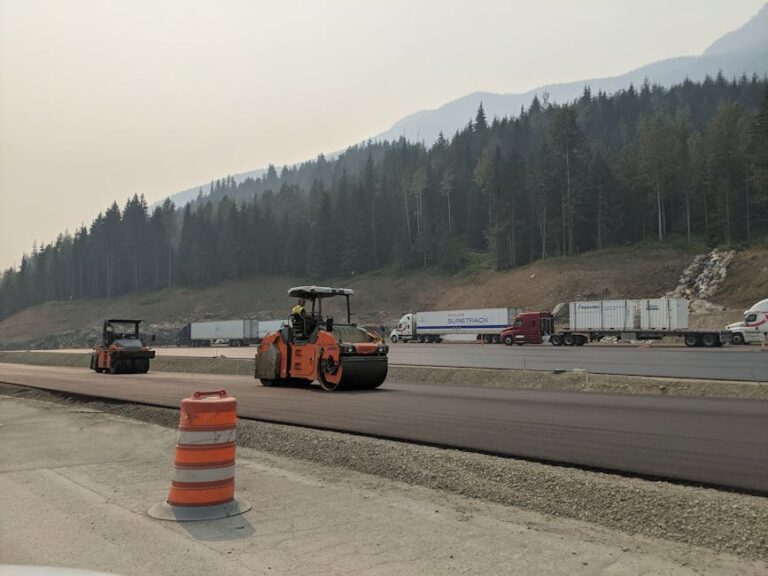The Ultimate Guide to Local SEO for Paving Contractors
Local SEO for paving contractors is the process of optimizing your online presence to appear in local search results when potential customers look for paving services in your area. This specialized form of search engine optimization focuses on improving your visibility in Google Maps, local directories, and location-based searches.
Here’s what you need to know about local SEO for paving contractors:
- Claim and optimize your Google Business Profile (formerly Google My Business)
- Ensure NAP consistency (Name, Address, Phone) across all online platforms
- Generate and respond to customer reviews regularly
- Create location-specific website content for your service areas
- Build citations in local and industry directories
- Earn quality backlinks from reputable local sources
“When someone needs asphalt paving work, they typically call the first listing on Google and work their way through the list,” explains Scott Rehnberg, SEO & Content Specialist at Improve & Grow. “Local SEO puts your business at the top of that list, making you the first call.”
The stakes are high: 33% of all clicks go to the top three search results, and 75% of users never scroll past the first page. For paving contractors, this represents a significant opportunity to capture exclusive, high-quality leads without competing on third-party platforms or directories.
What makes local SEO particularly valuable for paving contractors is the timeline for results. While national companies typically wait 6+ months to see SEO improvements, local paving contractors can reach the first page of Google local results within just 30 days with the right strategy.
Whether you’re struggling to generate consistent leads or looking to expand your service area, mastering local SEO will help you build a sustainable pipeline of exclusive prospects searching specifically for your services.
Why Local SEO Matters for Paving Contractors
If you’re a paving contractor, you’re part of an industry projected to generate over $100 billion in revenue this year. That’s a massive opportunity—but also means you’re facing serious competition. Here’s the reality check: 97% of people now search for local businesses online, with Google dominating the market.
“Near me” searches have absolutely exploded in recent years, growing over 200% year-over-year according to HubSpot. When someone needs a driveway repaired, a parking lot resurfaced, or a new walkway installed, they’re not flipping through the Yellow Pages anymore—they’re pulling out their smartphone.
“The days of relying solely on word-of-mouth and traditional advertising are behind us,” says Carl Lefever, Founder & Digital Marketing Strategist at Improve & Grow. “Today’s paving customers research online before making any calls, and the companies that appear at the top of those searches win the business.”
Think about the difference between leads you might get from paid directories versus those from local SEO for paving contractors. With paid services like Angi or HomeAdvisor, your leads are shared with multiple competitors, typically cost more to acquire, build no lasting brand equity, offer limited control over quality, and keep you dependent on their platform.
Contrast that with local SEO leads, which are exclusive to your business, cost less over time, build lasting brand value, convert at higher rates, and represent an asset you actually own (your website and Google Business Profile).
Need proof? One asphalt paving company we worked with generated more than double their expected leads in the first month—at 50% lower than expected cost per lead—simply by redesigning their website and launching paid search and local SEO for paving contractors campaigns.
How Customers Search for Paving Services
Understanding how potential customers look for your services is crucial for effective local SEO for paving contractors. Today’s property owners search in several distinct ways:
When someone needs paving work, they might type “asphalt paving near me” on their phone, ask Siri to “find paving contractors in Harrisburg,” search for specific services like “parking lot resurfacing in Lancaster,” look for solutions to problems with “fix cracked driveway York PA,” or simply open Google Maps and search for “paving contractors.”
Over 64% of these searches happen on mobile devices, and that number keeps growing. When these searches occur, Google typically displays three main result types: the “Local Pack” (top 3 local businesses with map pins), organic search results, and paid advertisements.
Your primary goal is appearing in that Local Pack, which sits above organic results and captures a significant portion of clicks. This is precisely where local SEO for paving contractors focuses its efforts.

It’s also worth noting that paving searches follow seasonal patterns in many regions. Search volume typically spikes in spring and summer months, making this the ideal time to have your local SEO fully optimized and ready to capture that seasonal demand.
Main Benefits of Investing in Local SEO
Investing in local SEO for paving contractors delivers several powerful advantages that other marketing channels simply can’t match.
First, you get free organic traffic once you’re ranked—no paying per click or impression like with ads. Your close rates will be higher because these leads find you when they’re actively searching for your specific services, not when you’re interrupting their day.
The long-term ROI is unbeatable. Unlike paid ads that stop generating leads the moment you stop paying, SEO builds lasting assets that continue working for you month after month. You’ll also enjoy improved credibility since appearing at the top of search results and Google Maps instills trust and positions you as an industry leader.
Perhaps best of all, you’ll get exclusive leads coming directly to you, rather than being sold to multiple contractors like with lead generation services. You can target specific geographic areas where you want to work, avoiding time-wasting leads from outside your service territory. And unlike national SEO campaigns that can take 6+ months to show results, local contractors can often reach the first page within just 30 days.
“We’ve seen paving contractors increase their lead volume within 60-90 days of implementing proper local search strategies,” notes Jen Leong, Digital Marketing Strategist at Improve & Grow. “The key is consistency in execution and focusing on the right ranking factors.”
When you invest in local SEO, you’re not just buying leads—you’re building a sustainable pipeline of exclusive prospects who are specifically searching for the services you provide, right when they need them most.
Local SEO for Paving Contractors: Ranking Factors & Google Business Profile
When it comes to local search rankings, Google relies on three key factors that determine who gets the coveted top spots:
- Relevance: How closely your paving business matches what people are searching for
- Proximity: How near your business is to the person searching or their specified location
- Prominence: How established and trusted your business appears online
While you can’t control where your customers are searching from, you absolutely can influence how relevant and prominent your business appears. This is where strategic local SEO makes all the difference for paving contractors.
At the heart of your local SEO strategy sits your Google Business Profile (GBP). This free listing appears prominently in Google Maps, the Local Pack, and standard search results. For many potential customers, it’s their first impression of your paving business.
“Your Google Business Profile is arguably the most important asset for local visibility,” explains Scott Rehnberg. “We’ve seen paving contractors jump from invisible to page one simply by properly optimizing their GBP and consistently generating reviews.”
Setting Up & Optimizing Your GBP
For effective local SEO for paving contractors, follow these straightforward steps to maximize your Google Business Profile:
Start by claiming and verifying your listing through Google Business Profile. Verification typically happens via postcard, phone, or email – a simple but crucial first step many contractors overlook.
Choose “Paving Contractor” as your primary category, then add relevant secondary categories like “Asphalt Contractor” or “Driveway Contractor” to appear in more relevant searches.
Complete every information field thoroughly. Your business name should be your exact legal name (no keyword stuffing!), use a physical address (never a P.O. box), preferably list a local phone number rather than toll-free, and link to your website – ideally a location-specific page. Include accurate hours, comprehensive service listings, and a compelling 300-character description that naturally incorporates keywords.
Visual content dramatically improves engagement, so upload high-quality photos showcasing your team, equipment, office/shop, completed projects (before and after shots work wonders), and action shots of your crew at work. These images help potential customers visualize the quality of your work.
Keep your profile fresh by creating Google Posts weekly – share recent projects, seasonal offers, or helpful maintenance tips. Enable the messaging feature so prospects can contact you directly, and list your core services with descriptions and pricing where applicable.
A proactive approach to Q&A can set you apart – add common questions and answers before customers even ask them. For a deeper dive into optimizing your profile, check out our Guide to Google Business Profile for Contractors.
Using Reviews to Climb the Local Pack
Reviews aren’t just nice to have – they’re essential for local SEO for paving contractors. Google explicitly states that review quantity, quality, and recency directly impact your local rankings.
“Reviews serve a dual purpose,” says Brian Welch, Digital Marketing Strategist at Improve & Grow. “They influence Google’s algorithm and persuade potential customers to choose you over competitors.”
Develop a systematic review generation strategy that becomes part of your business routine. Create a QR code linking directly to your review form, include review requests on invoices, follow up via email or text after completing a project, and train your team to naturally ask satisfied customers for feedback.
Focus on review velocity and recency rather than volume alone. Consistently acquiring 1-3 new reviews weekly signals to Google that you’re actively in business and satisfying customers. This steady approach outperforms getting many reviews all at once and then none for months.
Respond promptly to every review – both positive and negative. Thank happy customers sincerely, and address concerns professionally when they arise. These responses show potential customers you’re attentive and committed to satisfaction.
Use review responses strategically by mentioning your service area (“Thank you for choosing us for your driveway in [Location]”) and referencing specific services (“We’re glad you’re happy with your new asphalt parking lot”). This subtly reinforces your relevance for key search terms.
Avoiding GBP Spam & Penalties
Google actively enforces policies against spam and manipulation. Violating these rules can result in penalties or even suspension of your listing – a potentially devastating blow to your local visibility.
Resist the temptation to stuff keywords into your business name. “Best Paving Contractor in [City]” might seem clever, but it violates Google’s policies and risks penalties. Similarly, creating multiple listings for the same business location, purchasing fake reviews, selecting unrelated categories, or using virtual offices/P.O. boxes as your address will all put your listing at risk.
“We’ve seen contractors lose months of momentum after Google suspended their profiles for violations,” warns Carl Lefever. “It’s much easier to follow the rules from the start than to recover from a penalty.”
If you notice competitors violating Google’s policies, you can report them through Google Maps or the Business Profile support channels. Focus on building your own ethical, policy-compliant profile rather than trying to game the system – the long-term benefits of playing by the rules far outweigh any short-term gains from risky tactics.
By mastering these Google Business Profile fundamentals, you’ll establish a strong foundation for your local SEO strategy – putting you well on your way to dominating local search results and attracting exclusive, high-quality leads.
On-Site Excellence & Authority Building
While your Google Business Profile is crucial, your website remains the foundation of effective local SEO for paving contractors. Google evaluates numerous technical and content factors when determining local rankings.
Crafting Content That Ranks Locally
Creating content that resonates with both search engines and potential customers is an art form. For successful local SEO, your website content needs strategic organization and thoughtful optimization.
Your service pages deserve special attention. Each core service should have its own dedicated page with descriptive, keyword-rich titles like “Asphalt Driveway Installation in Lancaster County, PA.” These pages should include comprehensive service descriptions (at least 500 words), clear explanations of benefits and processes, high-quality project photos, and service-specific testimonials. Don’t forget strong calls-to-action that invite visitors to request estimates or consultations.
“The most common mistake we see paving contractors make is creating thin, generic service pages,” explains Scott Rehnberg, SEO & Content Specialist at Improve & Grow. “Google rewards depth and specificity—your content should thoroughly answer the questions potential customers are asking about your services.”
Location pages are equally important for local SEO as a paving contractor. Develop distinct pages for each city or area you serve, naturally incorporating location names throughout the content. Discuss local landmarks, paving challenges unique to the area, or relevant regulations. Including testimonials from customers in that specific location adds authenticity, while embedding a Google Map of your service area reinforces geographic relevance.
A robust FAQ section addressing common questions proves invaluable. Questions like “How long does asphalt paving last in [Location]?” or “What’s the best time of year for driveway paving in [Location]?” not only help with rankings but also build trust with potential customers.
Regular blog content keeps your site fresh and relevant. Consider topics like seasonal paving tips for local property owners, how regional weather affects asphalt maintenance, or case studies of notable local projects (with permission, of course).
When researching keywords, focus on terms with clear commercial intent—phrases like “asphalt driveway contractors [city]” or “commercial parking lot paving [location].” Tools such as Google’s Keyword Planner, Semrush, or Ahrefs can help identify the most valuable search terms for your business.
For more comprehensive content strategy guidance, check out our guide on how to Run a Successful SEO Campaign.
Building Citations & Maintaining NAP Consistency
Citations—online mentions of your business name, address, and phone number (NAP)—signal legitimacy to Google and significantly impact local rankings. For paving contractors, consistency is key when it comes to effective local SEO.
| Citation Type | Examples | Importance |
|---|---|---|
| Primary Citations | Google Business Profile, Bing Places, Apple Maps | Critical |
| General Directories | Yelp, Yellow Pages, BBB, Chamber of Commerce | High |
| Industry Directories | PavingDirectory.com, Angi, HomeAdvisor | High |
| Local Directories | City-specific business listings | Medium |
| Social Platforms | Facebook, LinkedIn company page | Medium |
“We often find paving contractors with 5-10 different versions of their business information online,” notes Jen Leong, Digital Marketing Strategist at Improve & Grow. “Cleaning up these inconsistencies frequently results in immediate ranking improvements.”
The secret to maintaining NAP consistency is creating a master document with your exact business information. Use this as your reference when setting up new listings or updating existing ones. Regular audits using tools like Moz Local or BrightLocal help identify and correct inconsistencies.
For paving companies with multiple locations, each physical location should have its own distinct citation profile, complete with unique phone number and address. This clarity helps both Google and potential customers understand your service areas.
Earning High-Quality Local Backlinks
Backlinks remain one of Google’s most influential ranking factors. For local SEO for paving contractors, quality local links trump quantity every time.

Building relationships with complementary local businesses creates natural link opportunities. Consider partnering with landscapers, general contractors, or real estate agents for mutually beneficial link exchanges. Your local Chamber of Commerce membership typically includes a valuable website listing, while community sponsorships of events, sports teams, or charities often earn recognition and links.
Guest articles for local news sites or industry publications position you as an expert while earning valuable links. Don’t overlook your material suppliers—getting listed on their “preferred contractors” pages provides both credibility and link juice.
Tools like Moz Open Site Explorer or Semrush can help identify your competitors’ backlink sources, revealing opportunities you might have missed. A single link from a respected local news site carries more ranking power than dozens of links from irrelevant or low-quality directories.
When it comes to backlinks for local SEO for paving contractors, always prioritize relevance and authority over sheer numbers. Each quality link strengthens your website’s standing in Google’s eyes and brings you closer to dominating local search results.
Tracking Success, Advanced Tactics & FAQs
Knowing whether your Local SEO for paving contractors efforts are actually working is about more than just watching your rankings climb. It’s about connecting those improvements to real business growth—more jobs, bigger projects, and higher revenue.
How to Measure ROI & Lead Quality
“The true measure of local SEO success isn’t rankings—it’s revenue,” emphasizes Carl Lefever, Founder & Digital Marketing Strategist at Improve & Grow. “We help paving contractors connect their marketing metrics to actual business outcomes like booked jobs and completed projects.”
Setting up proper tracking doesn’t have to be complicated. Start with Google Analytics to monitor your overall website traffic, see where visitors are coming from, understand how they’re interacting with your site, and track when they complete important actions like submitting a contact form. This free tool gives you a clear picture of your digital performance.
Next, connect Google Search Console to keep an eye on your search visibility. This shows you exactly which keywords are bringing visitors to your site, helps you identify technical issues Google might have with crawling your pages, and lets you submit sitemaps to improve how Google indexes your content.
For paving contractors, phone calls often represent the most valuable leads. Implementing dynamic call tracking lets you see which marketing channels are driving those calls, record conversations for training purposes, and measure how many calls actually convert into qualified leads.

The most successful contractors take measurement a step further by connecting marketing data to their business outcomes. This means tracking not just website visits and calls, but following those leads through your sales process to see which ones turn into paying jobs. Setting up proper lead attribution with UTM parameters and CRM integration helps you understand the full journey from initial search to completed project.
Review these metrics monthly and use what you learn to refine your approach. Is a particular service page generating lots of traffic but few leads? Maybe it needs a stronger call-to-action. Are you getting calls from outside your service area? Perhaps your location targeting needs adjustment. This continuous improvement ensures your Local SEO for paving contractors strategy evolves alongside Google’s ever-changing algorithm.
Common Local SEO Mistakes Paving Contractors Make
Even experienced contractors can sabotage their online visibility without realizing it. Avoiding these common pitfalls will keep your Local SEO for paving contractors efforts on track.
Neglecting Technical SEO is perhaps the most widespread issue. When your website loads slowly (anything over 3 seconds), mobile users can’t steer it easily, or it’s missing proper schema markup, Google takes notice—and not in a good way. With 64% of searches coming from mobile devices, having a site that frustrates smartphone users is particularly damaging. Use PageSpeed Insights to check your site speed and follow our guide on Google’s Core Web Vitals Update.
“The most common mistake we see is paving contractors trying to rank for broad terms like ‘paving company’ without any location modifiers,” notes Scott Rehnberg, SEO & Content Specialist at Improve & Grow. “This puts them in competition with national companies rather than focusing on the local searches that actually generate leads.”
Thin or duplicate content is another major issue. Each service page needs substantial, unique information—at least 500 words that actually help potential customers understand what you offer and why they should choose you. Generic paragraphs copied from manufacturer websites or other paving contractors won’t impress Google or your visitors.
Many contractors also make the mistake of ignoring review management. Not actively seeking new reviews or failing to respond to feedback (especially negative comments) hurts both your rankings and your conversion rates. Reviews directly influence how Google ranks local businesses and how potential customers perceive your company.
Inconsistent NAP information across the web creates confusion for both search engines and customers. When your business name, address, and phone number don’t match exactly across all platforms, Google struggles to connect these mentions to your business, diluting your local authority.
Other common mistakes include keyword stuffing (overusing search terms in an unnatural way), neglecting local content (failing to mention your service areas or regional considerations), and pursuing poor-quality backlinks from irrelevant or spammy directories.
Frequently Asked Questions about Local SEO for Paving Contractors
Q: How long does it take to see results from local SEO?
A: Unlike national SEO campaigns that typically take 6+ months to show significant results, Local SEO can produce visible improvements much faster—often within 60-90 days. Your Google Business Profile optimization typically yields the quickest wins, while building website authority takes longer. Your starting point, competition level, and how consistently you implement your strategy all affect the timeline.
Q: Should I have separate SEO strategies for different services or locations?
A: Yes, but within a unified framework. Create dedicated pages for each core service (asphalt driveways, parking lot resurfacing, etc.) and for each city you serve. Each page should target specific keyword combinations like “asphalt driveway installation in Lancaster County, PA.” However, your overall domain authority and citation strategy should remain consistent across all services and locations.
Q: How do I optimize for voice search?
A: Voice searches tend to be longer and more conversational than typed queries. Create FAQ content that answers common questions naturally, focus on long-tail keywords phrased as questions, ensure your Google Business Profile is fully optimized, improve your site’s mobile speed and usability, and use schema markup to help Google understand your content.
Q: How much should I budget for local SEO?
A: Effective Local SEO for paving contractors typically requires an investment of $1,500-$3,000 per month when working with an agency, or significant time if doing it yourself. While this may seem substantial, the ROI typically exceeds that of paid advertising or lead generation services over time, as you’re building owned assets rather than renting visibility.
Q: How does local SEO compare to Google Ads?
A: Both have their place in a comprehensive digital marketing strategy. Google Ads provides immediate visibility but stops generating leads when you stop paying. Local SEO takes longer to build but continues generating leads without ongoing per-click costs. Many successful paving contractors use Google Ads for immediate lead generation while building their local SEO foundation for long-term sustainable growth.
Q: Can I do local SEO myself or should I hire an agency?
A: While the basic principles of Local SEO for paving contractors can be implemented by business owners, the complexity, ongoing algorithm changes, and time requirements make professional assistance valuable. DIY SEO is possible if you have 5-10 hours per week to dedicate to learning and implementation. However, working with specialists like Improve & Grow often delivers faster results and stronger ROI.
Conclusion
Mastering local SEO for paving contractors isn’t just a marketing tactic—it’s become the lifeblood of sustainable business growth in today’s digital world. The numbers tell the story: 97% of consumers now search online for local services, and a third of all clicks go to just the top three results. Your visibility in local search has a direct line to your company’s bottom line.
Throughout this guide, we’ve walked through a proven framework for dominating local search in your service area—from optimizing your Google Business Profile to creating compelling content, building consistent citations, and managing your online reputation. What makes this approach so powerful is that it generates exclusive, high-intent leads while building digital assets that you actually own.
“We’ve seen paving contractors transform their businesses through local search marketing,” shares Carl Lefever. “One asphalt company generated more than double their expected leads in the first month at half the expected cost per lead after implementing these tactics.”
Unlike traditional lead services that essentially rent you access to shared prospects (often sending the same lead to multiple competitors), proper local SEO creates something much more valuable—a sustainable pipeline of customers searching specifically for your services. These prospects find you at exactly the right moment in their buying journey, resulting in higher close rates and better long-term customer relationships.
The paving industry is becoming increasingly competitive online, but there’s still tremendous opportunity for contractors who act decisively. Those who establish strong digital foundations now will enjoy a significant competitive advantage in the coming years. The beauty of this approach is that your results compound over time—each improvement in your local search presence builds upon previous efforts, creating momentum that becomes increasingly difficult for competitors to overcome.
Consistency is key. The strategies outlined in this guide aren’t one-time tasks but ongoing processes that require attention and refinement. By committing to this approach and measuring your results, you’ll be able to continuously improve your local visibility and lead generation.
Ready to take your paving business to the next level with proven local SEO strategies? Learn more about our contractor marketing services or contact us today for a free consultation. Your competitors are likely reading this guide too—the question is, who will act on it first?




